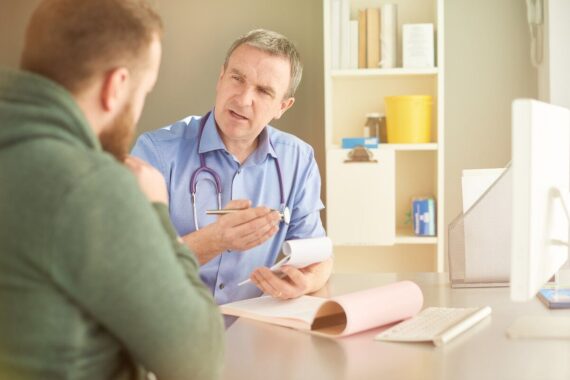Exclusive The average waiting time for a non-urgent, face-to-face appointment is 10 days, according to Pulse’s latest GP survey – quicker than before the Covid pandemic.
The average waiting time for a remote, non-urgent appointment meanwhile stands at eight days, according to the recent poll of over 800 GPs from across the UK.
This is a slight increase from Pulse’s last waiting times survey, carried out in September, when average face-to-face waits stood at 8.7 days.
However, it is down from waiting times faced by patients during 2016-2019, when average waits for a non-urgent face-to-face appointment stood at 13-15 days (see box).
GPs say that this is because there is a greater drive to deal with patients on the day, and triage has enabled practices to be able to use remote consultations or see other healthcare staff where appropriate, which allows for shorter waiting times for patients who need face-to-face appointments.
The figures also suggest that the perception that general practice is closed for business, or that GPs are unwilling to see patients face to face, is incorrect.
During the Covid pandemic, NHS England had instructed GP practices to adopt ‘total triage’ in order to stop the lethal disease spreading among vulnerable patients in their waiting rooms.
However, despite this instruction, GPs faced a backlash for reducing face-to-face contacts during the pandemic.
East Sussex LMC chair Dr Russell Brown told Pulse: ‘The perception [that general practice is closed] is erroneous and has always been erroneous. It’s just nonsense. We are open, we are seeing patients.’
He said that seeing a GP is ‘absolutely’ not as bad as has been made out and that most places are ‘working really hard to make sure that people see the professional they need to see’.
He added: ‘The thing that doesn’t get into the mainstream media is all the extra services that were running through PCN, all the ARRS staff, the physios and the pharmacists and etcetera.
‘Those people count towards our appointments, but the media don’t seem to understand that that’s still general practice, because it’s not a doctor. There’s not enough doctors. The number of GPs that we’re short is just ridiculous.’
Asked why he thought practices are now seeing patients more quickly, chief executive of Essex LMC Dr Brian Balmer told Pulse: ‘I have a horrible feeling they’re flogging themselves into the ground.
‘They are desperately trying to keep up with demand. It’s good news that people have got access to GPs, but that would be my worry.
‘They just keep seeing whatever turns up and I suspect they’ve become more efficient, or it would be nice to think they’ve passed more routine stuff onto ARRS staff.’
Kent and Medway GP partner Dr Karen Potterton, a survey respondent, highlighted that GPs prefer seeing patients in person.
She told Pulse: ‘Face-to-face assessment as an experienced GP allows you to gather a wealth of non-verbal information that informs your decision making, often without you even being fully aware of it.’
Ipswich and East Suffolk GP Dr Louise Beale told Pulse that her practice is ‘trying to deal with everything on the day’, however she warned workload pressures means GPs are ‘close to drowning’.
The latest British Social Attitudes Survey found that patient satisfaction with GPs fell to their lowest-ever level, with difficulties getting an appointment featuring as a key issue.
However, the survey did not target people who had actually tried to get a GP appointment.
And NHS England-backed research found just one in 10 patients preferred face-to-face GP appointments during the Covid pandemic, with most requesting telephone consultations instead.
Survey questions in full
How long is the average waiting time for a non-urgent in-person appointment at your practice, following initial triage?
Less than a week 325 1-2 weeks 237 2-3 weeks 146 3-4 weeks 43 4-5 weeks 14 More than 5 weeks 13 Don’t know 46
How long is the average waiting time for a non-urgent remote consultation appointment – either video or telephone – at your practice, following initial triage?
Less than a week 456 1-2 weeks 195 2-3 weeks 92 3-4 weeks 27 4-5 weeks 8 More than 5 weeks 6 Don’t know 34
The survey was open between 25 February and 3 March, with all UK GPs asked to respond to these particular questions. It featured a range of questions on various topics. 824 GPs responded to these two questions.
We asked every year ‘How long is the average waiting time for non-urgent appointments at your practice?’, offering the options of less than a week, 1-2 weeks, 2-3 weeks, 3-4 weeks, 4-5 weeks and more than 5 weeks. We calculated the totals using a midpoint analysis, removing those who answered ‘don’t know’.
Pulse October survey
Take our July 2025 survey to potentially win £1.000 worth of tokens















and how long is the wait to see a dentist for a non urgent issue ?
and you (usually) have to pay for that !
“However, the survey did not target people who had actually tried to get a GP appointment.” Having spoken to numerous relatives who seem to moan at me about their ongoing trials and tribulations about trying to speak to or see their GP, this data seems to deceptive and misleading given their experiences.
Getting past the reception staff can be an insurmountable problem in some clinics in different parts of England. Triaging systems like mid staffs with the reception staff deciding on whether it’s gets through to the GP.
I recommend my relatives move to a better health system like Australia. With Shorter waiting times to see a GP and faster access to Investigations. Then they moan about how that’s unachievable for them. Just no pleasing some people.